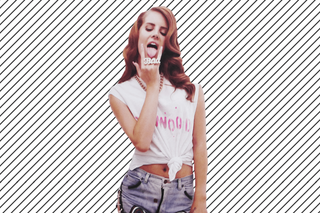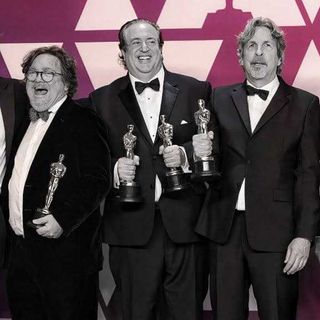
Controversial Crush: Lana del Rey
Glamorizing violence and consistently appropriating other cultures haven’t managed to dent her influence, or the elegance of her musical endeavors.

In the series Controversial Crush, we dote on controversial women and tell you why.
There’s the imagery of sand, cola, dashboards, the faint scent of salt, sweat, and the cool blue Pacific Ocean. There are lyrical hints of Nabokov, Whitman, Hemingway, and Wilde — interspaced with the Beatles, Sublime, Bowie, and the Eagles. There are terrible men (bad boys, I suppose), full-throated singing about longing, loss, violence, and opulence. It’s Elizabeth Woolridge Grant. Lizzy. Sparkle Jump Rope Queen. Lana Del Rey. In her music and her aesthetic, she presents as carefully curated as the magazine tear-outs pinned carefully to the peeling walls of a teenage girl’s room. She’s the embodiment of the sad, existentially lonely young girl’s fantasy — of cool-girl glamor, of exalted, carefree beauty, of being forever too good for where she’s at, of the continuous draw towards bigger and better.
Lana del Rey was never the ideal pop star. She’s had her share of notoriety, from the benign (a disastrous Saturday Night Live performance that invited blogger ire) to the annoying (relentless appropriation of Native American, African American, and Latin American culturesand skirting around socio-political ideas) to the troubling (romanticizing violence against women in her music and filming a scene for a Marilyn Manson videoin which she’s sexually assaulted by director Eli Roth). There’s also a smattering of brattiness — i.e., railing against people who critique her music.
Del Rey’s got quite the rap sheet, but it’s not a rap sheet she ignores. Over the span of her almost decade-long career, she’s grown from apolitical, vacuous, and aestheticizing sadness to someone who actively makes protest music, and calls out fellow musicians like Kanye West for supporting men like Donald Trump. Her political growth is quantifiable, her honesty regarding past mistakes is refreshing, and her music only gets better over time. What’s not to love?
Related on The Swaddle:
Controversial Crush: Beyoncé, Her Feminism and Her Influence
The singer-songwriter is often critiqued for her glorification of themes like violence against women — needy women who long for their male partners, women who often don’t come across as role models for younger girls. Her song “Ultraviolence“ is perhaps the greatest offender with the oft-cited-with-reproach lyric “He hit me and it felt like a kiss/like true love.”
Here’s the thing. One should definitely critique del Rey’s lyric for its glorification of abuse, but that critique often goes for the jugular minus the nuance, which is odd considering that nuance is often what the critic expects from the singer-songwriter. Few who critique del Rey for taking feminism a few steps back will point out that there’s no ‘ideal’ victim of abuse who thinks all the correctly terrible things about their abuser. Some still miss, love and even long for the people who perpetrate violence against them. Plus, there’s often an assumption that del Rey is merely romanticizing abuse, rather than talking about her own distress. In an interview with Pitchfork regarding her dismissal of feminism, del Rey says, ” I don’t like it… I sing ‘Ultraviolence’ but I don’t sing that line anymore. Having someone be aggressive in a relationship was the only relationship I knew. … I do feel comfortable saying what I was used to was a difficult, tumultuous relationship, and it wasn’t because of me.”
del Rey also previously made comments distancing herself from feminism, which attracted ire from culture critics. In an interview with Fader, she says, “For me, the issue of feminism is just not an interesting concept. … Whenever people bring up feminism, I’m like, god. I’m just not really that interested.” Sure, this sounds a bit annoying, considering how singing about violence against women is a significant part of her brand. But then, she goes on to state, “My idea of a true feminist is a woman who feels free enough to do whatever she wants.” Perhaps, Lana del Rey’s feminism is choosing not to be a public mouthpiece for feminism, and that’s fine. It’s definitely way more honest than multiple celebrities who are ‘yass-kweened’ for using feminism as a branding strategy.
Related on The Swaddle:
Controversial Crush: Jameela Jamil and Her Brand of Body Positivity
Plus, much later, she addresses why she turned away from feminism with her trademark honesty, “When people asked me the feminist question before, I was like, I’m not really experiencing personal discrimination as a woman. I feel like I’m doing well. I headline shows just like the Weeknd does. I got tons of women in my life, love women, support women.” I just felt like, Why don’t we talk about the music first? I can tell you that what I have done for women is tell my own story, and that’s all anyone can do.”
Over time, del Rey’s commitment to feminism has only increased. To NPR, regarding #MeToo, she said, “One of the issues I had over the last 10 years was there weren’t that many options to be super vocal and powerful without a lot of backlash and repercussions. It was a very male-dominated environment at certain times. That’s why I think this whole movement is so important — the people that don’t get the #MeToo movement are just, I don’t get them. I don’t get those people. It’s like, do you not get how hard it is sometimes just to sort of be safe and have your own voice as a woman?”
Del Rey is called out for a variety of reasons, and quite often those reasons are valid. She remains deeply insensitive with respect to her cultural appropriation — and hasn’t addressed it yet — but she does demonstrate room to potentially evolve and grow. Hope is a dangerous thing for us to have with respect to how we idealize celebrities and expect too much from them, but let’s have it anyway.
Aditi Murti is a culture writer at The Swaddle. Previously, she worked as a freelance journalist focused on gender and cities. Find her on social media @aditimurti.
Related


Oscar Nominations Are Out, And They’re Overwhelmingly White and Male — Again
